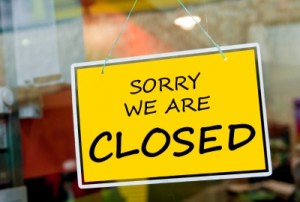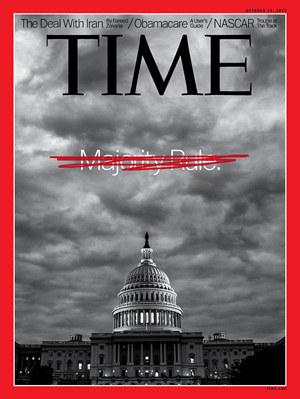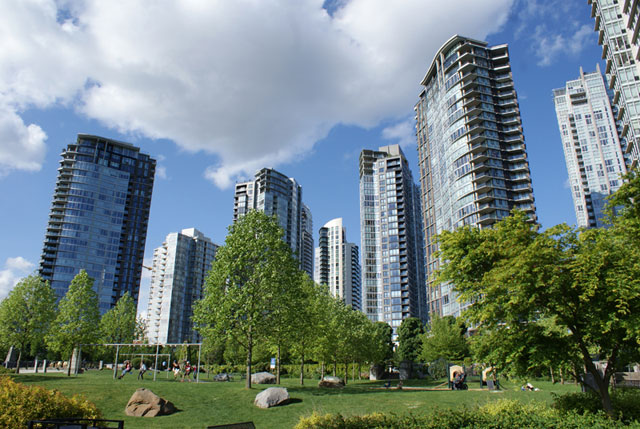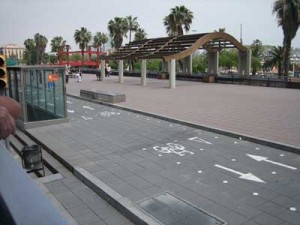We all know the government shutdown is stupid. What else can we learn?
As we all now know, the dipshittery in Washington, DC has reached feverish levels and the U.S. government is “closed.” (Or more specifically, many non-essential services are on furlough.)
While I could rant and whine like most of the internet is doing right now, I thought my time might be better spent taking a look at what we can learn from this latest ridiculousness. So here we go:
Our political press sucks
OK, maybe we already knew that, but give me a break! How bad does this have to get? The corporate media is simply regurgitating press releases and repeating the framing of the leadership. And worse, framing it as just another dysfunctional fight between two equally stupid political parties. This is not accurate!
For example, look at this idiocy from USA Today:
As fights go, Wall Street views the slugfest between Democrats and Republicans over the government shutdown as the undercard event. The main bout is the coming showdown over raising the debt ceiling and making sure the U.S. has enough cash to pay its bills and avoid the unthinkable: defaulting on its debt.
To frame this as a partisan infighting is completely misleading! ONE side shut down the government in an exploitative move to overturn the results of an election.
Republicans hate America
Sorry to be blunt, but it’s true. What else can we conclude from a party that is willing to injure its own country just to get its own ideological way? If Russia threatened to cause this much damage to our country unless we capitulated to its demands, we’d consider it an act of war. Why do we consider a threat from within to be any different?
Look, I don’t care if you’re a conservative person or not (we used to have sane conservatives in the Republican party once upon a time). Even a true conservative would have to look at the moves by this party as traitorous. They’re putting party over country and it’s sickening. Here’s an idea: win a couple elections and then you can do whatever you want.
It’s worth remembering that the Civil War wasn’t started because of “slavery” per se, it was because an earlier version of the tea party refused to abide by the results of the 1860 election.
Congress keeps getting paid during a “shutdown”
In one of the more disgusting moves, members of Congress keep getting their paychecks during a shutdown, even as the Capitol Police work for free to protect them. “I need my paycheck,” said Rep. Renee Ellmers in one of the more disgusting quotes to yet be made public.
One person stops this
As happy as I am to kick the Republican party in the nuts over this, in truth there are enough votes in the Congress RIGHT NOW to end the shutdown. But Speaker John Boehner is refusing to call a vote, demanding “compromise”. Again, it’s hard to figure this out from the corporate media, but it’s true.
Gerrymandering is the biggest political problem in America right now
Yes, our politics are totally screwed up right now. Repeatedly polling shows the American people are on a completely different planet than the Congress. Gerrymandering has left us with a Congress that chooses its own voters instead of the other way around. Republicans are running out of older, disgruntled white people to keep them in office so they simply have drawn lines capturing more and more bizarre boundary lines in ways to barely hold their majority. There were many more votes for Democrats in the last Congressional election than Republicans but the Rs held the majority. The system is broken. ALL congressional boundaries should be formed by bipartisan committees or by independent judges, not drawn arbitrarily by the beneficiaries.
Obama is paying the price for his earlier weak negotiating
President Obama may go down in history as one of the most ineffective negotiators with Congress. Early in his presidency, he took an overly deferential approach, while the Republicans continually moved the goalposts on him. Now in his second term, he’s realizing no one respects him and they assume he’ll cave if they just stick to it. Hopefully they’re wrong, but history hasn’t made me very confident in that.
The debt ceiling is a much bigger deal
It’s been obvious for some time that Republicans have been very anxious to destroy the economy so they can make the president look bad. It’s bizarre behavior that has never been practiced by the other party. But will they go to the extent of not paying our bills and destroying the full faith and credit of the United States of America in the process? If I was a betting man, I’d say Obama gives them some sort of face-saving way out of this and we bumble along until the next time. But if the level of crazy has gotten deep enough, this wackjobs could actually dismantle the world economy, apparently for no other reason than they want to make a point. I doubt they’ll pull the trigger, but I’m keeping my money uninvested for a while longer just in case.
It’s about Obamacare — sort of
Republicans tend to be much more strategic than Democrats. I definitely think the timing of the Obamacare launch and the shutdown are not coincidental. I’m sure they saw an opportunity to erase all the happy stories of desperate people signing up for insurance from the media. I do think they bit off more than they could chew and this could end up being their Waterloo. We’ll see. Obamacare was ALREADY funded so the idea they could stop it by using the U.S. economy as a hostage is weird, but then again, see my next point.
The GOP primaries are the driving force in American politics right now
What is making the Republican party so crazy? Well, obviously it’s gerrymandering as mentioned above, where hardly any Republican need fear a Democrat taking their seat. However, they do have one fear: Another, more right-wing Republican taking them out in a primary. Show one sign of weakness toward the black president and these guys are gone. It’s a phenomenon creating a self-selecting evolution toward more and more crazy. As long as these voters remain so easily manipulated or as long as parties can carve out seats to their own benefit, this continues.
OK, maybe that’s enough political talk for one day. I have no desire to turn this into a politics blog, but given how hard it is to figure out what’s happening by watching our national media, I thought I’d put together a short backgrounder (from my own biased perspective, of course). Thoughtful comments and opposing perspectives are welcome. Nonsense name-calling and uninformed political stupidity will be deleted. Have fun!
UPDATE: Time Magazine gets it:




